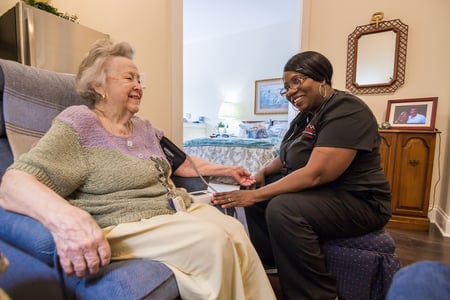
Aging brings a heightened focus on health and well-being. Adopting healthy habits can profoundly affect both the length and quality of our lives. Below, our team at Brickmont Assisted Living explores crucial habits for healthy living and lengthened longevity, offering practical tips for older adults and their families to seamlessly integrate these into daily life.
1. Regular Exercise
Regular exercise is one of the cornerstones of a healthy lifestyle and is critically important for individuals. Physical activity helps maintain muscle strength, flexibility, and balance, reducing the risk of falls and injuries. Additionally, exercise has been shown to improve cardiovascular health, boost immunity, and enhance mental well-being.
Engage in low-impact exercises like walking or swimming to stay active while minimizing stress on the body and promoting overall well-being. Walking is a simple way to get moving and can be done almost anywhere, while swimming provides a full-body workout and is easy on the joints, making it ideal for those with arthritis or other joint issues.
2. Balanced Diet
A balanced diet rich in nutrients is crucial for maintaining health and vitality. Proper nutrition helps prevent chronic diseases, supports cognitive function, and keeps energy levels stable.
Superfoods include leafy greens, fatty fish, and nuts and seeds. Leafy greens like spinach and kale are packed with vitamins and antioxidants that help fight off diseases. Fatty fish such as salmon and mackerel are excellent sources of omega-3 fatty acids, which support heart and brain health. Nuts and seeds such as almonds, walnuts, and chia seeds provide healthy fats and protein, essential for maintaining muscle mass and overall vitality. Incorporating these nutrient-dense foods into their diet can greatly enhance the health and well-being of individuals.
3. Social Engagement
Staying socially engaged is vital for mental and emotional health. Regular social interactions can reduce feelings of loneliness and depression and even improve cognitive function.
If you don’t know where to start, try joining clubs or groups that match your interests, such as book clubs, gardening groups, or fitness classes. You can also try volunteering in your community to meet new people and give back. And for those who are technology savvy, you can stay connected with family and friends through video calls and social media.

4. Regular Health Check-Ups
Habits for healthy living start with prioritizing your health and wellness. Preventive healthcare is essential for early detection and treatment of potential health issues. Regular check-ups can identify problems before they become serious, ensuring better health outcomes.
Scheduling annual physical exams with your primary care physician, keeping track of appointments, and discussing any new or unusual symptoms with your doctor promptly are just a few ways to keep an eye on monitoring your well-being.
Assisted living communities are designed to promote habits of healthy living by providing residents with services to help ensure individuals maintain a healthy lifestyle while receiving the support they need.
5. Adequate Sleep
Quality sleep is crucial for overall health, particularly for older adults. Restful sleep supports memory, mood, and physical health.
If you are having trouble falling or staying asleep, begin by establishing a regular sleep routine. Go to bed and wake up at the same time each day, create a comfortable sleep environment with a cool, dark, and quiet bedroom, and avoid caffeine and electronic screens before bedtime.
6. Stress Management
Chronic stress can have detrimental effects on health, contributing to conditions such as hypertension, diabetes, and depression.
You can start by practicing mindfulness techniques like meditation or deep breathing exercises. Engage in hobbies that bring joy and relaxation, such as painting, gardening, or reading, and socialize regularly, as both physical activity and social interactions can reduce stress levels.
7. Mental Stimulation
Keeping the mind active is essential for maintaining cognitive function and reducing the risk of dementia and other cognitive decline.
Explore hobbies that you enjoy, such as puzzles and games that challenge the brain. Try completing crosswords, Sudoku, or playing chess. You can also learn something new, like a language or musical instrument, or keep the brain active by reading books, attending lectures, and engaging in discussions that stimulate thought and curiosity.
8. Limiting Harmful Habits
Certain habits, like smoking, excessive alcohol consumption, and substance abuse, can significantly reduce lifespan and quality of life.
You can replace harmful habits with healthier alternatives, such as chewing gum instead of smoking, and even surround yourself with a network that encourages positive lifestyle changes.
--
We invite you to contact our team at Brickmont Assisted Living or visit any of our senior living communities in Atlanta to experience firsthand all the perks of assisted living that can lengthen and enrich your life.



.png)